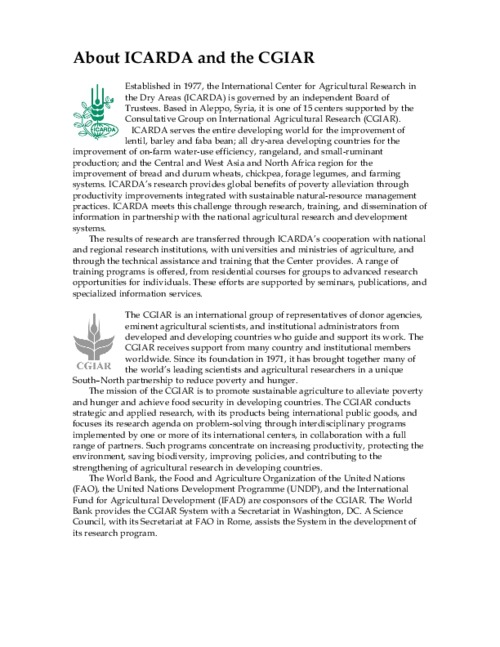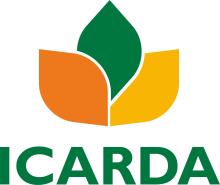Resource information
Strong partnerships with national agricultural research systems and other stakeholders constitute the backbone of ICARDA’s research agenda. The outreach programs of the Center play a key role in promoting partnerships in their respective sub-regions and in implementing collaborative research and training programs. To make an assessment of the efficiency and effectiveness of the partnerships, the Board of Trustees of ICARDA commissioned an external review of its outreach programs in 2003. The distinguished Review Panel reaffirmed the success of ICARDA in enabling dry-area countries in the world to become fully involved in, and benefit from its programs. The Panel also noted that the Center is held in high esteem by national scientists, research managers, and policy makers in the Central and West Asia and North Africa (CWANA) region—ICARDA’s eco-geographic mandate area.
Within the context of contributing to the Millennium Development Goals, the Center made a strong case at the World Water Forum, held in Japan, and at the International Conference on the Development of Dry Lands, held in Iran, about the urgent need to address the issue of water shortages that are threatening food security in the dry areas, and proposed actions that could lead to sustainable use of natural resources and help alleviate poverty and hunger. The Center
also actively participated in the project development for Challenge Programs on “Water and Food “ and “Biofortified Crops for Improved Nutrition,” and three of its six projects submitted were approved for funding.
The use of cutting-edge science is becoming more crucial in addressing the daunting global challenges of producing more with less land and water to feed the increasing populations, while protecting the health of the natural resource base. During the year, ICARDA made significant strides in the use of such tools as biotechnology, geographical information systems and expert systems to develop crop varieties that can withstand stressful conditions, and technologies for
improved water conservation and use efficiency.
Conflicts in the CWANA region continued to pose challenges for the Center. During the year, our work to rebuild agriculture in Afghanistan continued with increased emphasis on seed systems and capacity building, while preparations were set in motion to support rebuilding agriculture in Iraq. A collaborative work plan was developed in partnership with senior Iraqi
officials and scientists. Implementation of the plan began during the later part of the year, and is expected to gain momentum in 2004. Our work in the Palestinian territories, mainly through human resource development, providing seeds of improved varieties and assisting in agrobiodiversity conservation using natural resource management practices, continued despite the prevailing difficult situation there.
In presenting this Annual Report to our readers, we would like to extend ICARDA’s grateful thanks to donors for their continued support to the Center’s research and training activities. We also thank our partners throughout the world for their valuable contributions to the collaborative work and achievements reported here.


